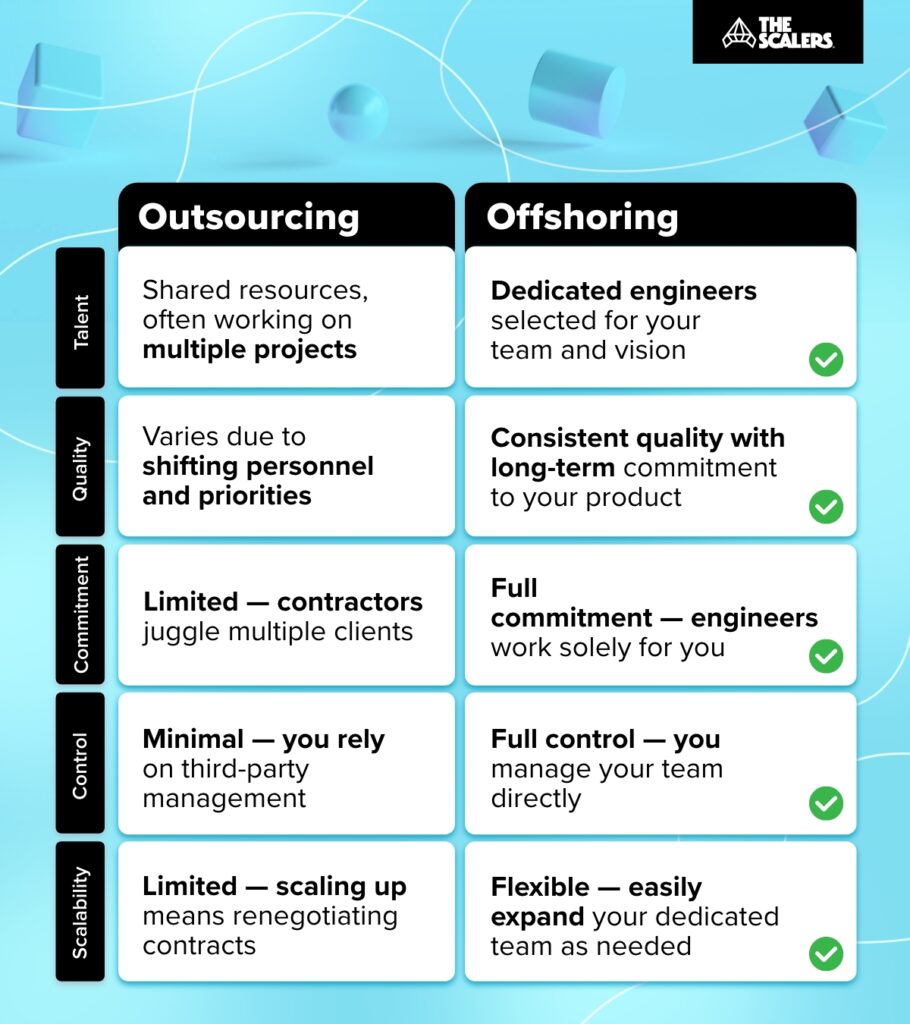- Outsourcing works best for short-term projects where you need quick help but don’t need full commitment or control over engineers.
- With offshoring you can access specialised talent and build dedicated teams with professionals who work exclusively for you.
- Outsourced engineers often juggle multiple clients and lack investment in your long-term success.
- Offshore engineers integrate with your culture and operate as an extension of your in-house team.
Outsourcing and offshoring don’t just mean ‘giving your work to someone else.’ While they might seem like the same business model, or a mix many call ‘offshore outsourcing,’ they’re two distinct approaches to building tech teams.
In this guide, we compare outsourcing vs offshoring and analyse their benefits and drawbacks. After reading it, you’ll be able to distinguish between both models and decide which one best fits your organisation’s goals.
What is outsourcing?
Outsourcing means delegating tasks to a third party in your home country or abroad, generally on a short-term basis.
For example, you can outsource the testing of a new software feature to an external QA team for a few weeks due to the unavailability of your in-house engineers. Or a startup with no in-house team that needs an MVP to show to potential investors.
Companies that opt for outsourcing are looking for a quick, affordable solution due to an increase in their workload or need for extra support. They value cost-cutting over the niche specialisation and long-term commitment of the engineers they hire.
What is offshoring?
Offshoring means moving operations or processes to another country, normally thousands of miles away from your headquarters.
For example, you can set up an offshore software development team in India to design, build, and maintain software applications for your organisation.
Businesses that decide to go offshore are looking for a high-quality, long-term solution to extend and scale their tech teams. They prioritise hiring specialists who are fully committed and aligned with their culture, mission, and vision.
Adith Khan, Director of Partner Success at The Scalers, says companies value two aspects the most when offshoring: finding the right cultural fit and seamlessly integrating offshore engineers with the in-house team. “Offshore engineers can become a natural extension of the company’s core team, especially when they report directly to the organisation. This direct alignment simplifies collaboration and day-to-day operations. And with a centralised setup, the process of building and managing a distributed team becomes far smoother and far less hectic than traditional outsourcing.”
Outsourcing vs offshoring: Main differences
The key differences between outsourcing and offshoring can be understood through several parameters:
Talent
With outsourcing, the talent you get is often a shared resource, as engineers may be working on multiple projects at once. With offshoring, you get professionals who work just for your company and under your name.
Quality
The quality of outsourced engineers can vary, depending on the reliability of your service provider and the availability of the right talent at a given time. On the contrary, offshoring provides you with a steady flow of engineers possessing specialist skills.
Commitment
Professionals hired via outsourcing focus on completing temporary tasks or short-term projects with little commitment to the long-term goals of your business. Offshore engineers work just like your in-house team and are 100% dedicated and committed to your success.
Control
When you outsource, generally, you have limited control over projects, as they are managed by a third party. If you opt for offshoring, you can maintain full control over your operations, even if your headquarters are located in Europe and your new team is located in Asia.
Scalability
Outsourcing doesn’t give you many options to extend your team if you need to unless you renegotiate the contract with your service provider. Offshoring allows you to expand your team with top talent whenever needed.

Advantages of outsourcing and offshoring
Now that we’ve outlined the crucial differences between outsourcing and offshoring, we’ll talk more in-depth about both models by analysing their benefits.
Advantages of outsourcing
Flexibility
A stand-out benefit of outsourcing is the flexibility that comes with it.
Let’s say a FinTech builds an in-house Quant development team. That team is permanently employed, so even if it’s a quiet period and there’s no real work to be done, they’re still paying them for sitting around twiddling their thumbs.
Outsourcing, on the other hand, can be managed as little as a few hours or days at a time — the engineers only work when an organisation needs them. This level of flexibility is particularly important for companies whose work is more sporadic.
Affordability
Outsourcing is a business model that usually comes with significant cost savings. For instance, the cost of maintaining infrastructure and administration is almost completely eliminated, making it a very budget-friendly approach.
According to a study by Deloitte, cost reduction remains a primary driver for companies choosing outsourcing.

Better resource allocation
There are countless business functions in every company, many of which are non-core activities, ones which don’t offer any distinct advantage over competitors.
These non-core functions can distract key team members from focusing on their primary tasks, therefore wasting resources. Outsourcing to a third party means organisations can focus completely on their core competencies.
Advantages of offshoring
Ownership
With offshoring, companies maintain full control over their core business while collaborating closely with an offshore provider. The process of recruiting and building a high-performing offshore team is typically handled in partnership, combining the company’s vision with the provider’s local expertise.
While the offshore provider manages the recruitment process, the company retains the final say on who joins their team.
Top talent pools
One major benefit of going offshore is accessing vast talent pools with engineers who possess skill sets that are hard to find at home.
Countries like India and the Philippines, two of the most popular offshoring locations in Asia, put major emphasis on educating and training their people. The result is a huge number of skilled, well-educated, and English-speaking talents just waiting to be hired.

Cost-effectiveness
Thanks to the lower cost of living compared to the West, offshoring allows companies to access exceptional talent at a fraction of the cost they’d pay at home.
By hiring professionals with niche skills in talent-rich locations worldwide, organisations can build teams with engineers who are just as skilled, or even more so, than those available locally – all for 50% or even 70% less than what they’d pay in Europe or the US!
Scalability
Offshoring and scalability go hand-in-hand.
By building offshore engineering teams, companies can scale faster while reducing pressure on their in-house teams. This means:
- Increasing development capacity with more Scrum teams.
- Expanding beyond product development by adding new technologies like data and machine learning.
- Enhancing efficiency with shared services like QA, DevOps, and support.
This provides a great opportunity for organisations to expand their product offerings, driving innovation and growth across new markets.
Nextpoint, a leading US legal software company, demonstrates what smart, sustainable scalability looks like. Faced with a limited domestic talent pool in which qualified engineers were either too expensive or not a good cultural fit, they needed a better way to grow.
After offshoring to India with the right partner in 2022, they quickly scaled to 16 engineers (with more to come) and built a Ruby on Rails team that helped launch their new product. The country’s talent pool was deep enough to find the right technical skills and the right people who meshed with the company culture.
Disadvantages of outsourcing and offshoring
We’ve covered the good. Now, let’s dive into the drawbacks of using outsourcing and offshoring to build tech teams.
Disadvantages of outsourcing
Loss of control
When a company outsources tasks to an external team, it inevitably loses some control over how the work is being conducted. This could lead to poor communication and visibility between the company and the team, potentially undermining the success of the whole project.
Hidden costs
Though outsourcing on a contract basis always appears cost-effective, companies must always be prepared for any hidden costs which the vendor might bill them for at a later date. Companies frequently pay above their initial agreement on account of the work done being ‘out of scope’.
By focusing too heavily on cheap costs, it’s also very easy to hire professionals without the necessary skills for the job, resulting in a lower-quality product or service than expected.
Lack of customer focus
Your outsourcing partner may be catering to several other businesses at once. This makes it impossible to expect 100% focus and attention from them. Again, companies that opt for outsourcing risk receiving products or services that are not quite up to the mark.
Johnson Health Tech (JHT), a global leader in the manufacturing of commercial and residential fitness equipment, ran into this wall when they tried to outsource. The freelancers they worked with couldn’t integrate with their systems or test software in the actual machines, the hardware that their engineers needed to work with daily. Without a centralised process, delivery slowed to a crawl, and the workflow became increasingly difficult to manage.
They were working with multiple vendors rather than a cohesive team, making it impossible to execute quickly. What JHT needed were engineers who could plug directly into their workflow, not contractors working in silos, which they achieved by setting up an offshore team in Bangalore in 2021.
Lack of creative thinking
Outsourced engineers often follow instructions without questioning or suggesting improvements. They do what they are told to… and that’s basically it.
Since they’re not invested in your business goals, they rarely go beyond the brief to offer innovative solutions. This can limit your ability to refine ideas or explore better approaches.
Disadvantages of offshoring
Geographical distance
Sometimes, collaborating with a team in a different time zone can be challenging. When the necessary tools and procedures are implemented poorly, it can lead to delivery lags and a resultant slower time to market products and services.
However, these issues can be solved by an experienced offshore development partner who’ll ensure the means of collaboration are properly implemented.
Businesses that want real-time collaboration with their teams and prefer them to be in the same time zone may view geographical distance as a major disadvantage of offshoring.
But what some see as a drawback, others see as an opportunity. Organisations that understand that some of the most talented engineers live and work in vibrant tech hubs like Bangalore, India, don’t hesitate to build teams thousands of miles away from their home countries.
Outsourcing vs offshoring: Which is the better model for your business?
For short-term projects lasting less than a couple of months, outsourcing is usually the best option. On the contrary, offshoring is the way to go if you’re looking to build a long-term, high-quality team with specialised talent while still retaining complete control of the process.
At The Scalers, we’ve crafted a unique offshore model that sources top Indian engineering talent. We’ve built 100+ tech teams over the past decade for industry leaders like Preqin.
We wanted to have our own team and make it very ‘Preqin’ and we wouldn’t have been able to build that team so quickly without The Scalers. They handled all of the hassles so we could spend our time building quality software and collecting quality data. And we wouldn’t have grown as Preqin without the team in India.

If you’d like to learn more about our model’s unique advantages and how we can help you set up a world-class dedicated development team, contact one of our senior executives by filling out this form. They’ll answer any questions you may have!
FAQs
Companies offshore to access specialised talent that’s hard to find locally, scale their teams faster, and reduce costs without sacrificing quality.
Tech leaders can hire developers (e.g., Ruby on Rails or full-stack engineers), QA engineers, DevOps specialists, Scrum masters, and data or machine learning experts, among others. Offshore hubs like Bangalore, India, offer deep talent pools in almost any technology you can think of.
Both involve delegating work to teams outside your organisation to access specialised skills and reduce operational costs. They also allow companies to focus on core business functions while external talent handles specific technical tasks.
Build Your Team,
Not Just a Contract
With The Scalers’ offshore dedicated development team, you get engineers who join your workflow for the long run. Grow steadily, stay flexible, and work with people who care about the product as much as you do.







